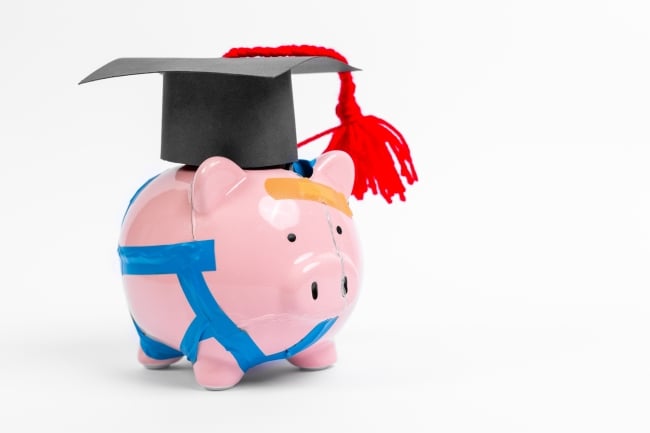You have /5 articles left.
Sign up for a free account or log in.

While most people believe in the value of postsecondary education, high costs limit access and create doubt on the return on investment.
iStock/Getty Images Plus
Higher education’s value has come under public scrutiny in recent years, with fewer U.S. adults confident in the benefits of a college degree.
“For voters and people who are interested in pursuing and want to pursue a higher education—we’ve spent many years asking them that exact question: how do you define value? And overwhelmingly, not to oversimplify, but it is primarily economic,” said Angela Kuefler, a partner at Global Strategy Group, at a panel discussion at Third Way’s Value in Higher Ed Summit.
When evaluated further, a sticking point for most Americans is they don’t believe higher education is worth the cost students are paying—or the debt they’re accruing—compared to the salaries they’re earning. New data from Pew Research Center, released May 24, finds almost half (47 percent) of Americans only believe college is worth it if students don’t take out loans.
A recent Student Voice survey by Inside Higher Ed, conducted by Generation Lab, found the majority of students believe their education has value but only 7 percent agree higher education institutions, in general, offer good value for what they charge for an undergraduate degree.
A college degree still holds its historic value in boosting a young person’s earnings, and those with a degree are less likely to be in poverty, but high costs of entry prove a barrier to access and enrollment for many.
Rising costs. Almost seven in 10 (69 percent) Student Voice respondents say higher education institutions in general charge too much for an undergraduate education.
The cost of higher education has steadily increased over the past decade across nonprofit institutions, according to data from the National Center for Education Statistics. In 2023–24, the average published tuition and fees for full-time students at a public four-year in-state institution was $11,260, 2.5 percent higher year-over-year before adjusting for inflation. A private nonprofit four-year institution averaged $41,540, 4 percent higher year-over-year before inflation.
A Brookings Institute evaluation of colleges’ posted costs versus actual cost students pay is much lower, depending on a family’s annual income, though still rising. However, four in 10 Student Voice survey respondents say their institution’s sticker price is too high.
Additionally, 38 percent of respondents say the general public underestimates the actual price of college. A Gallup-Lumina Foundation survey found only 23 percent of adults without degrees could guess the cost of a bachelor’s degree within $5,000 of its price tag, highlighting a lack of transparency around costs of higher ed.
Who’s paying for it? When confronted with this high price, many students say they turn to loans to pay for their degree, which can leave them in debt and reduce their total earnings after graduating, hurting the overall return on investment.
High school students considering their plans after graduation say they worry about how they will pay for college (62 percent) and 45 percent plan to take out student loans, according to ECMC Group data from this past summer.
A 2023 survey from College Ave Student Loans found 46 percent of current students say they’re going to use federal student loans to pay for college and 20 percent are going to use private student loans.
In 2023, 70 percent of parents with college-bound children said they worry about having enough money to pay for college, a 4 percentage-point increase compared to the year prior, according to a poll from Discover Card. The number of parents who say they will pay for all of their child’s education (27 percent) is also on the decline (39 percent in 2022).
Families of traditional-aged students are also wary of the high price. Parents say college is necessary to find a good job (73 percent), but nearly half (46 percent) say they question whether it’s still a good investment, many (68 percent) are concerned about student debt compared to post-college earnings.
Buck stops here: High costs also limit access for students and determine which institution they’ll enroll in, or if they enroll at all.
A September 2023 Spark451 poll found 30 percent of parents said their child would have attended a different college if money was not a factor. Over half of high school students ruled out a college or university because of the cost and the majority of students rank cost as among the most important factors in their enrollment decision, alongside academic quality and availability of majors.
“Some of the best data tells us unequivocally, higher education is going to leave you better off economically,” Julie Ajinkya, senior adviser at HCM Strategists said at Third Way’s summit. “It’s hard for myself as an individual to really understand what a million dollars over the course of a lifetime means, whereas immediately, I know I have certain bills, I know that I have to worry about housing and other basic needs.”
The Gallup-Lumina Foundation study found, among students who would enroll in college, the same number of respondents (53 percent) say financial aid and scholarship is just as important as their confidence in the value of the degree and credential (53 percent).
“It goes back to this idea of needing very, very clearly articulated connections between the courses you’re going to take and the potential jobs and careers that you could end up with,” Ajinkya said.
Working individuals say the cost of tuition (56 percent) is what prevents them from pursuing additional education, seeing more value in credentials than a four-year degree.
Institutional leaders are noting current students have tightened their purse strings as well. Colleges reported an increase in students and families filing requests to adjust their financial aid eligibility during the COVID-19 pandemic, which has since leveled off.
The Trellis Strategies fall 2023 student wellness survey found 71 percent of college students report experiencing financial difficulties or challenges while in college. Among currently enrolled students who have considered stopping out, 31 percent cite cost as a reason.
Is it worth it? Overwhelmingly, polling finds a majority of people believe in the value of some postsecondary education.
- Student Voice—83 percent of students say the value of their college is somewhat or highly valuable, considering their learning and future benefit versus the cost of attendance.
- Gallup and the Lumina Foundation—71 percent of bachelor’s degree students strongly agree or agree that the degree they’re receiving is worth the cost.
- Third Way—80 percent of voters say a four-year college degree is valuable.
- CollegeAve—Eight in 10 students say a college degree is crucial for their future.
On a fiscal level, research shows that the average college degree program does produce a financial return on investment. The Institute for Higher Education Policy (IHEP) found 83 institutions, who represent 93 percent of students, receive a minimum economic economic return on investment within 10 years of starting college.
But whether a four-year degree is the most valuable investment a student could make remains up for debate. Four in 10 Pew respondents say it’s not too or not at all important to have a four-year college degree in order to get a well-paying job in today’s economy, and half say it’s less important to have a four-year degree to get a well-paying job today than it was 20 years ago.
So what? For higher education leaders, understanding the concerns students hold in pursuing higher education can help in addressing them and making sure students get their return on investment.
Career pathways can be one way to connect students to tangible goals they can aspire to and help them see how their education connects to their lives beyond, Ajinkya said.
Promoting career services, along with scholarships, can also address concerns for potential students, Kuefler said.
Demystifying the admissions process can also help students feel more confident in their decisions. “As students are applying to college, they feel like outsiders in the process, everything just feels super-secret and vague, almost like it was designed to confuse you,” Ajinkya said. “Until we clarify that whole process, and help students understand what it actually takes, what it will cost, we’re going to see a lot of confusion.”
We bet your colleague would like this article, too. Send them this link to subscribe to our weekday newsletter on Student Success.
This article has been updated to correct the attribution of a statistic by CollegeAve and the measurement of ROI by the Institute for Higher Education Policy.




